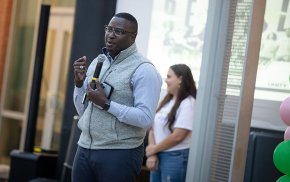
Student life taking shape
A Q&A with Harry Titus, Ed.D., dean of students
In his first six months as dean of students at Lenoir-Rhyne, Harry Titus, Ed.D., has spent significant hours listening to the students, learning about what they need and want from their student experience. Looking back, Titus reflected on the challenges and triumphs of his first semester and how student life is getting even better at LR.

Q: Can you describe the state of student life at Lenoir-Rhyne right now?
A: It is one of excitement, growth and innovation. You know, I think this has been our first academic year really going back to what we would consider normalcy after COVID. And so in the new normal, I would call it, we have been focused on being intentional about what engagement looks like for student life, listening to our students in an impactful way, and providing the programs and activities they want. Students are driving what programming looks like.
On the other side of that, we’re being intentional around support services through our new Office of Student Support and Outreach, which has expanded from a reporting system for only faculty and staff members. Now students can refer other students for support. For example, if my roommate seems to be struggling, I can go to my computer and submit a referral. It’s been very exciting, and the engagement has been high.
Q: What are some of the trends for student life on campuses around the country, and how do those trends look at LR?
I try and get on a call monthly with other deans and VPs (vice presidents) of student affairs to keep up with the national trends, but also look at trends within our region through organizations like the Appalachian College Association. I think what we are seeing nationally is true here as well. During the pandemic, students were more isolated, and everything was on a computer screen. Now that we’re returning to normalcy, students want engagement and a sense of community, but they need some help getting there. We want to meet students where they are. So, we've been doing more partnerships with academic affairs, athletics, the community, and we’re going to the places where our students already gather – residence halls and common areas around campus – to foster engagement in those spaces.
Q: What are some examples of programs or events that have gone memorably well?
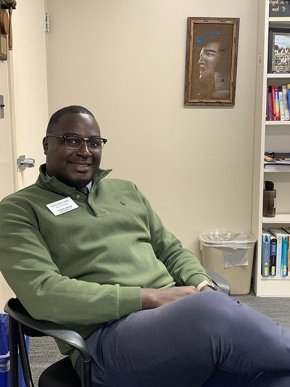
One surprisingly popular event is bingo, which is very inclusive to all students. You don't have to be physically adept or have any special expertise. Anyone can come in and either get a paper card or load a digital card on their phone – and there’s a lot of socializing and community built in. We did an LR-themed night, where we taught students about the history of LR through bingo, and they loved it. In addition, this year’s fall fest was exciting, and we’ve been partnering more with food trucks, which has been a huge hit for our students as well.
Finally, leadership development has been huge for us as a way to focus on educational content through our programming. We want to develop student skills for life by offering programs teaching students about what it means to be a leader. For example, fraternity and sorority life hosts monthly leadership caucuses for their members, exploring leadership strategies and program design.
Q: What’s an area where you’d like to see more growth?
One area where we’re continuing to focus is getting buy-in from students early in the process of planning and executing events. We want to make sure the things we're doing are student-centered from the outset of programming. We’re creating student advisory groups for large-scale programming and bringing the Campus Activities Board (CAB) into the conversation early in the planning process to share what they want to see happen. As we grow, we want to continue to grow our communication with students because that ensures we’re advancing the mission of the institution and creating new programs, support services and a residential experience where our students can truly thrive.
Students care about their experience at LR. They want to share, and they want to be heard, and that has made it much easier to work toward this goal and build a student-centered strategy.
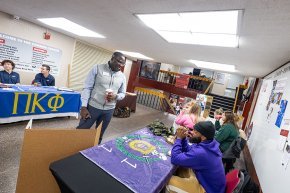
Q: What are the priorities for the next six months?
An immediate priority is infrastructure, ensuring that we have systems and processes in place that will be efficient for our students who want to engage or utilize support services. For example, students can use a digital platform to sign up for their housing assignments, which also makes it easier to connect with their roommates. Our support services have digital systems in place to set up appointments or make referrals. The easier it is for students to access these services, the greater the likelihood they will use them.
With planning and programming, as I mentioned, we’re being very deliberate about bringing students into the conversations early on and ensuring that the student life staff are visible and available around campus so we can get student input as we build a strategy going forward. For example, this semester I’ve hosted Donuts with the Dean on the last Friday of the month, where students can meet me and special guests from around campus, ask questions, share their concerns. We’ll continue to listen, learn and be strategic around what we're doing.
Q: Following on that, can you describe the long-term vision for student life at LR?
We want student life to be seen as the central hub for the out-of-classroom experience, whether that’s programming and activities, support services, where you live.
The long-term goal is to foster a vibrant community, a community of care and belonging for every single student on this campus – undergraduate, graduate, residential, commuter – everyone.
Q: Last question, is that a velvet Elvis painting hanging on the wall behind you?
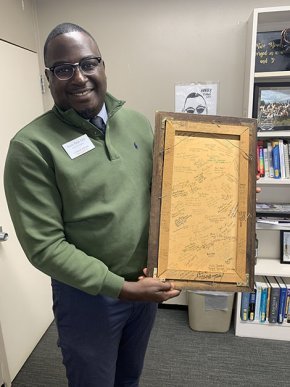
Yes. I learned two weeks ago, the Office of Student Life has a long tradition for new members of the team. When you come on board, you sign the back of this Elvis painting and you hold it in your office for 30 days. They waited until this semester to get to know me first, but on the back is everyone who has worked in Student Life for a very long time. There are multiple layers of the backing now because they keep running out of room. I’ll be passing it along to Casey Enright [director of student involvement and leadership] next week.
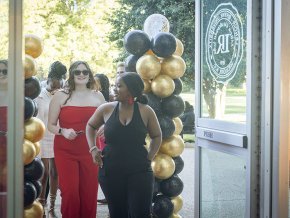
The revamped 2024 Student Life Awards gave students "A Night to Remember" with recognition and celebration of the joys of being a Bear.
View More
Susan McArver, Ph.D., took a deep dive into the role of the church behind the history of colonization and domination over Indigenous peoples in the Americas during her fall Explore Course, “The Land and its Inhabitants.”
View More